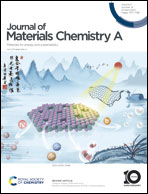Recycling inactive lithium in lithium–sulfur batteries using organic polysulfide redox†
Abstract
The lifespan of practical lithium–sulfur (Li–S) batteries is hindered by the incessant formation of inactive Li. Recycling inactive Li is a promising strategy to recover Li inventory yet this has never been achieved in Li–S batteries due to the obstacle of Li polysulfides (LiPSs). Herein, organic polysulfide redox is proposed to recycle inactive Li by employing 2-aminophenylacetonitrile (APA) as a redox precursor. APA first reacts with Li and then with S to form an oxidant for recycling inactive Li (O-RIL) by connecting long-chain PSs with the moiety in APA. Then, O-RIL diffuses to the anode side, reacting with inactive Li and generating a reductant for recycling inactive Li (R-RIL) with short-chain LiPSs. The circulation of R-RIL and O-RIL enables continuous redox to recycle inactive Li, which improves the lifespan of Li–S batteries from 40 to 140 cycles under practical conditions. This work demonstrates the importance of recycling inactive Li for developing practical Li–S batteries.

- This article is part of the themed collection: Journal of Materials Chemistry A Emerging Investigators


 Please wait while we load your content...
Please wait while we load your content...